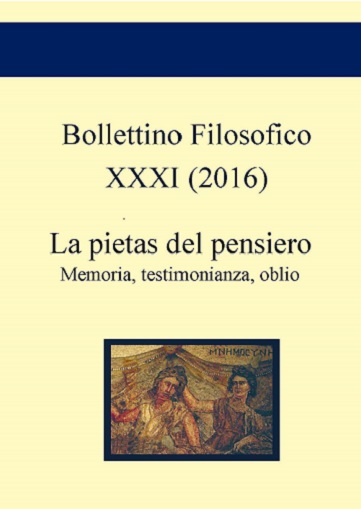Il pensiero come pietas
Abstract
Starting from Vergilius’ “pius Aeneas”, then going through Emmanuel Lévinas’ Autrement qu’etrê ou au-delà de l’essence and Sigmund Freud Vergängligkeit and Zeitgemässes über Krieg und Tod, my claim is that pietas is opposite to any feeling and to any behaviour of arrogance, and is therefore the courage to face with faith and without previous assurances the destiny of decadence that affects in the historical time all of us and what we feel and appreciate as our values of beauty and of perfection in nature and in culture. For Sigmund Freud in particular, to whom I dedicate most interest and attention in the essay, pietas is the acknowledgement of the value of the eternal beauty which should not be in any way diminished by its being consumed by time and history. In spite of its being precarious in the flowing of the historical time, the value of the beauty things, enjoyed by us in any single moment, is for ever. And this pietas toward the precariousness of natural and cultural beauty is furthermore what assures us that not mourning but hope is the last word of mankind.Downloads
Bollettino Filosofico pubblica in internet, ad accesso aperto, con licenza:
|
|
CCPL Creative Commons Attribution |
L'autore conserva il copyright sul suo contributo, consentendo tuttavia a chiunque "di riprodurre, distribuire, comunicare al pubblico, esporre in pubblico, rappresentare, eseguire e recitare l'opera", purché siano correttamente citati l'autore e il titolo della rivista. L’autore, al momento della proposta di pubblicazione, è inoltre tenuto a dichiarare che il contenuto e l’organizzazione dell’opera è originale e non compromette in alcun modo i diritti di terzi, né gli obblighi connessi alla salvaguardia di diritti morali ed economici di altri autori o di altri aventi diritto, sia per testi, immagini, foto, tabelle, sia per altre parti di cui il contributo può essere composto. L’autore dichiara altresì di essere a conoscenza delle sanzioni previste dal codice penale e dalle leggi speciali per l’ipotesi di falsità in atti ed uso di atti falsi, e che pertanto Bollettino Filosofico è esente da qualsiasi responsabilità di qualsivoglia natura, civile, amministrativa o penale, e sarà dall'autore tenuta indenne da qualsiasi richiesta o rivendicazione da parte di terzi.
